Registration Form Optimization Part 2: Social Logins
One of the most common best practices marketers love giving out is adding social login buttons to speed up signup processes, optimize their registration forms, and increase conversion rates. However, do best practices work for everyone? In this post I take on social login – is this the right choice for you?
First thing’s first – what, exactly, is a social login?
A social login (sometimes known as a social sign-in) is when a company decides to give users the option to register to its site using an existing login from a third party social network site (such as Facebook, Google+, Twitter, LinkedIn, and Pinterest).
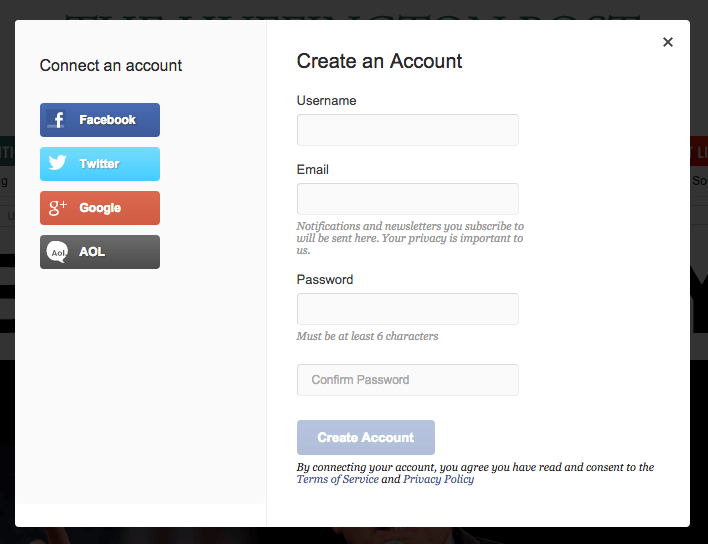
Here is the Huffington Post registration page – you can create an account or choose from several social accounts to connect to (huffingtonpost.com).
These days, many companies are choosing to provide a social login or sign-up option. There are pros and cons and a lot of discussions about this, as we started to discuss in our last post about registration best practices, both on the business/company side and on the user side.
You can find it in different formats and on many different sites.
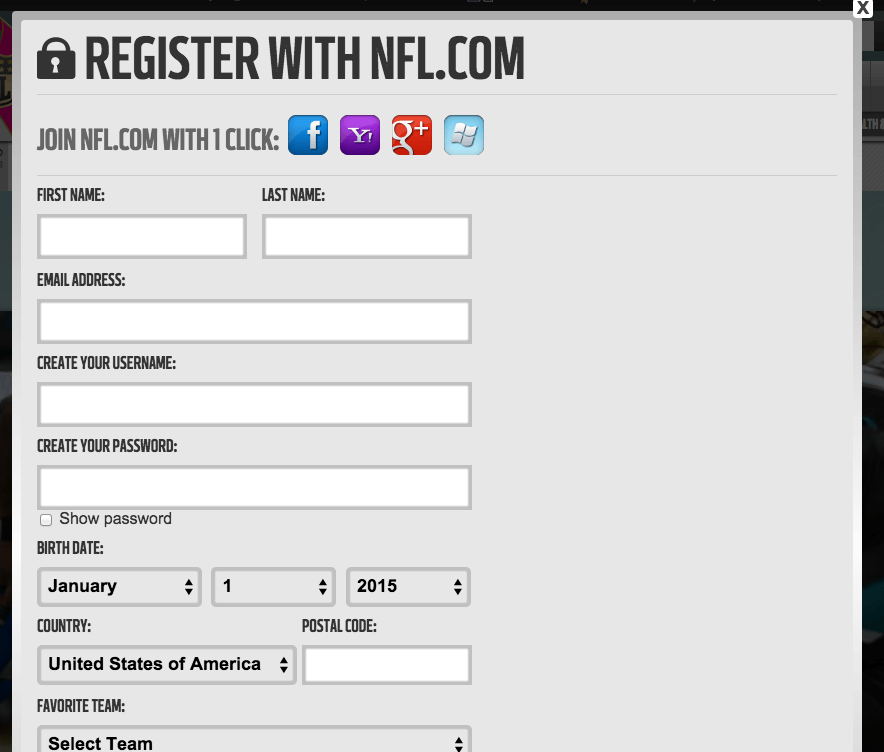
NFL.com focuses on this long registration page, but you can also join with one click by connected to a social account! They also chose to design it differently with no big buttons.
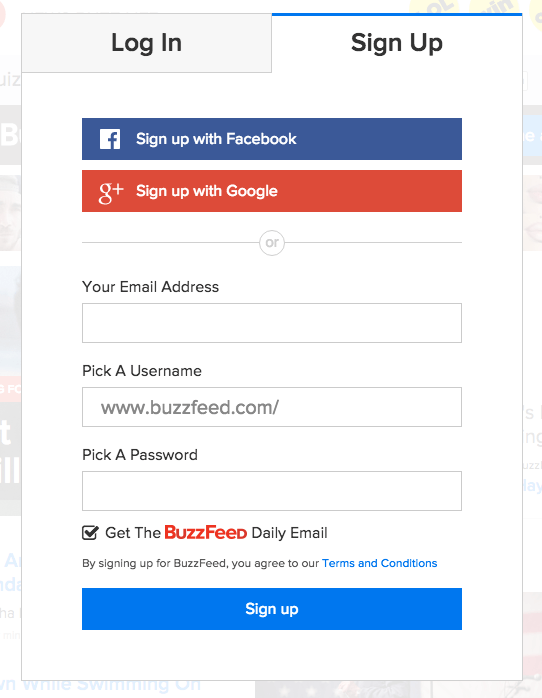
Buzzfeed allows users to connect with Facebook and with Google+ along with creating a unique account with their email (buzzfeed.com)
Here is a break down of the reasons why you should, or perhaps should not, use social logins.
Why you Should Use Social Logins:
-
Fighting the Password Fatigue: When you are an active member of the online community, you have several sites you may use that require a password. Each site has their own password requirements – from having 6 characters minimum to needing 8 characters with a mix of capital letters, lowercase letters, numbers, and at least one of these: #@$!&%*. over 57% of users have over 5 passwords they need to remember. There are already solutions like Lastpass and Password Safes (or if you’re like me – you have a note somewhere titled “Songs To Learn To Play” – to throw people off- where you write all your passwords down, or maybe on a page at the end of a notebook or something…shhhh) to remember all these endless passwords.
This is no joke! According to research by Janrain and Blue, 92% of people will leave a site and don’t even bother to reset their password if they have forgotten their password information. So with all of this fatigue and low energy, Social Logins provide a solution for this problem because there is no need to remember more passwords or create any either.
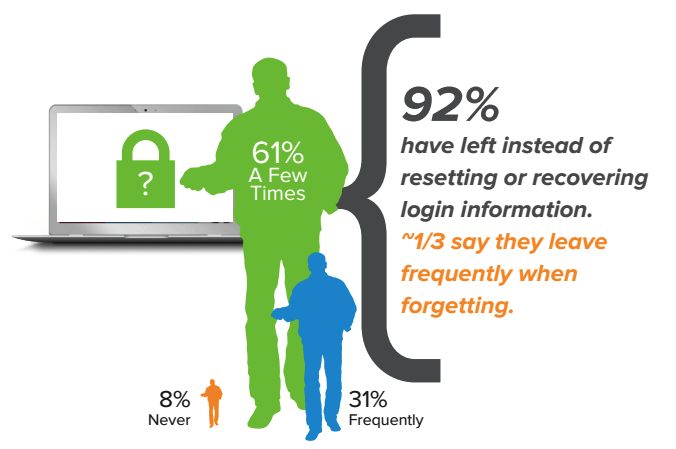
Janrain and Blue research
- Speedy registration process: Let’s get some numbers straight:
-
86% of users say that needing to create a new account bothers them.
-
77% of users support the use of social login buttons and say that every website should support them (Webhostingbuzz).
These all lead to the fact that many users use fake emails and details to sign up, making the information you are collecting irrelevant. Social login buttons provide a quick and hassle-free way for your customers to sign up and get going. As Cialdini explains, asking potential customers to take a small step (in this case signing up in a click) is a great way to get them started with a larger request (paying).
-
- Market Research Advantage - When a user signs in with their social account, you, as a company/marketer can gain information on them, including photos, birthday, email, and contacts/friends. Depending on the allowance in relation to your site, you can also learn about their likes and dislikes, their employment, where they went to school, where they live, their age, sex, and everything they may have on their profile. This can make your target audience easier to research, understand, and target! Social logins can open a whole new world of data about your customers’ purchasing behavior.
 With over 1 Billion active Facebook users (as so beautifully illustrated by Webhostingbuzz’s infographic) that means you have 1 billion potential users for whom you can make registration speedy, with just one click!
With over 1 Billion active Facebook users (as so beautifully illustrated by Webhostingbuzz’s infographic) that means you have 1 billion potential users for whom you can make registration speedy, with just one click! - User Engagement – Facebook collected data on its own social logins (so you may want to take this data with a grain of salt) but according to them: People who sign in to the Huffington Post with Facebook spend 8 minutes more than the average reader and view 22% more pages. If that’s not proof enough, users that visit NHL.com via their Facebook sign in spend 85% more time and watch more videos and read more articles than users that are not connected with Facebook. Connecting via a social network can:
- increase time on a site,
- increase engagement with material
- It’s easier to hit “like” and “share” when you’re already connected
- and it naturally just opens your Facebook so all of your friends can see it too!
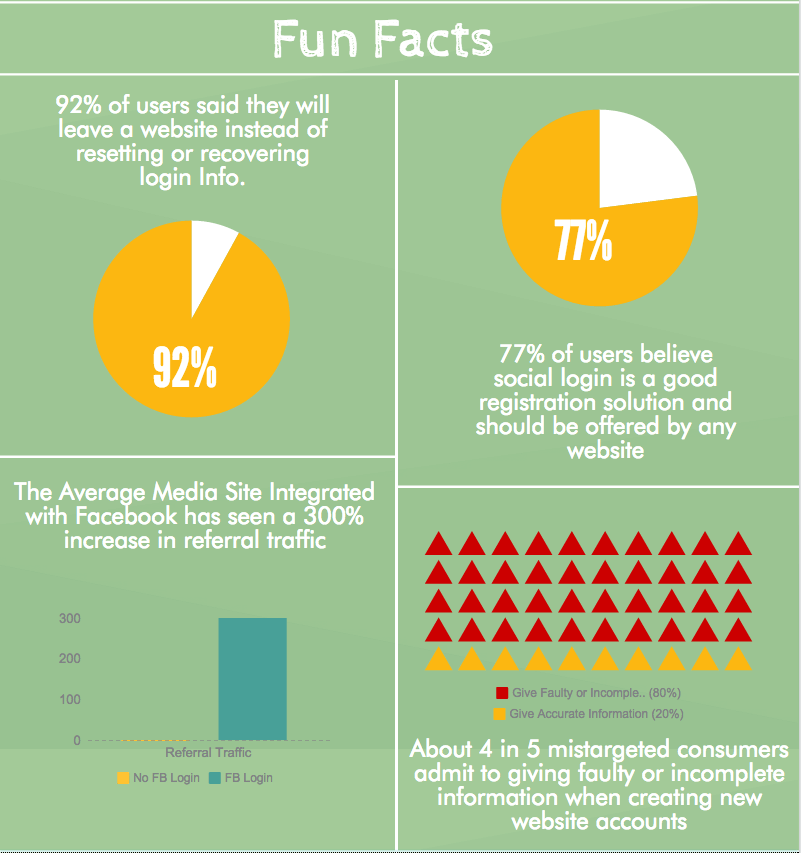
Our own infographic – with data from loginradius and webhostingbuzz
These are all great but there are also some disadvantages to this whole big social login phenomena everyone has been rushing to and some things you may want to consider before putting these on your site.
Why You May Not Want to Choose Using Social Logins:
1. Choice Anxiety – another way to say ‘analysis paralysis’ which happens due to the stress of making a decision and having to choose. With marketers wanting to appeal to all target markets and not “miss out” their landing pages end up looking like this:
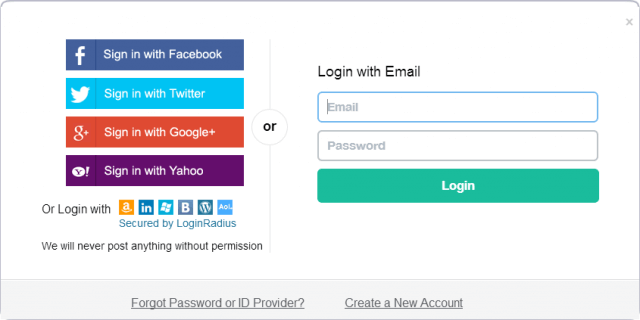
-
Facebook login – to give their younger audience an easy way to log in
-
Email registration option – open for those who don’t feel comfortable or do not use social platforms.
-
Google+ – because some people prefer to login with their email/google account
- and Twitter social logins- they’ve noticed their target audience can be active there
Here’s what your customer is probably thinking:
“Oh this is a cool site and exactly what I was looking for! Okay I have to Sign Up. Do I want to sign up with my Twitter, my Facebook, my Google +, or my Email? Hmm….Do I want to give access to my social profile or do I want to put in my email and make up a password? I don’t know! I can’t decide!….I don’t have time for this. I’ll have to come back later”
2. Branding Considerations – Mailchimp wrote an interesting article about adding social logins. First of, if you’re branding yourself, you want to consider whether you want to be associated with these social networking third parties. You can test how much they increase their conversions (in Mailchimp’s case it helped by about ~3%) and see if it’s worth it. If a social network account gets hacked – their account with you can get hacked as well. If one of these third party social networks do something that has negative PR implications, which you have no control over and had nothing to do with, your website may suffer the consequences as well.
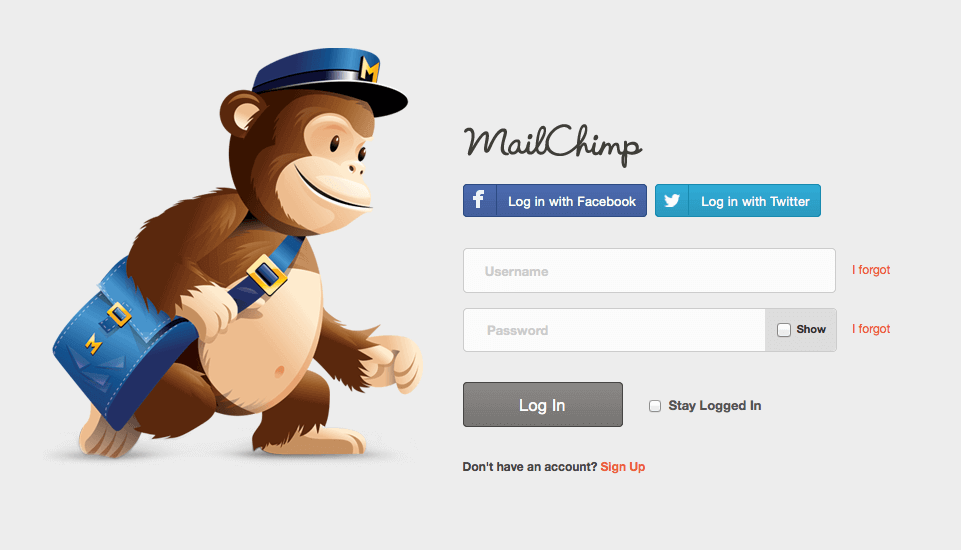
This is no longer their login page (mailchimp.com)
3. Trusting A Third Party Server- When your registration logins rely on someone else – a third party, with third party servers, if they crash, or shutdown, or other things that-shall-not-be-named happen, then your user cannot enter your site to his or her account. You may want to produce a backup plan in case this happens.

Which social logins users prefer. (loginradius)
4. User Accessibility – If you choose to use social logins through platforms like Facebook, you may end up rendering your website useless because some libraries, schools and workplaces block social networking sites due to productivity and security reasons. In addition, some countries (e.g. China) have active censorship regimes where third party sites may not be censored, but they are blocked because the social network site, and therefore the login, is blocked.
5. User Privacy Concerns: One thing to note is that there are users who know the power and access they give to companies when using a social login, and they will choose to not sign up to a company that only has a social login because they are willing to take up another password into their memory so as not to endanger their privacy. It is also important to remember the users that may not have social profiles (although with over 1 Billion Facebook users and over 500 million Google+ users, what is the likelihood of that?)
Now you know the general pros and cons of social logins but social logins are not for everyone. As a business, there are some things to consider when thinking whether you should use a social login.
Are Social Logins The Right Registration Tool for Your Site?:
-
What are you offering? If you have mostly content and you’re sending it out via email, then you want users to put in their email and not necessarily connect to their social network. If you are offering products, and people are able to like them and add them to their wishlist, etc – then a social log in may be perfect for you!
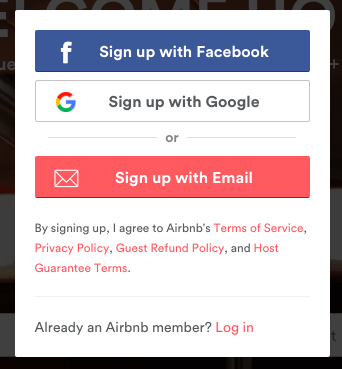
Airbnb.com
- Who Is Your Target Audience? Depending on your target audience and their use of social networks, you may want to consider whether you want to increase choice anxiety if most of your users are ages 35+ or living in China.
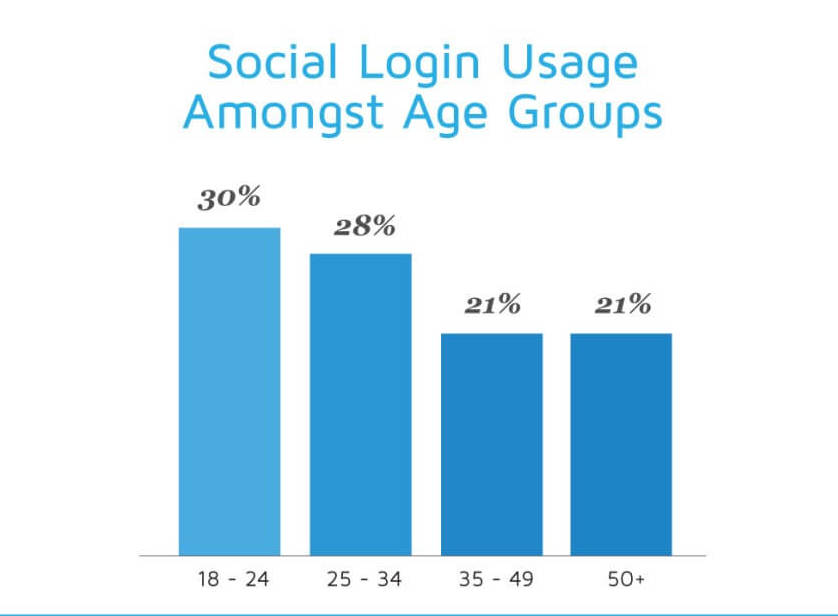
LoginRadius
We did our own experiments with Facebook login options in registration forms.
One test we ran attempted to solve the Choice Anxiety issue by putting the Facebook login option but kept the email option as a link below for those who want that. It’s there as an option, but it’s not another button that pulls away attention.
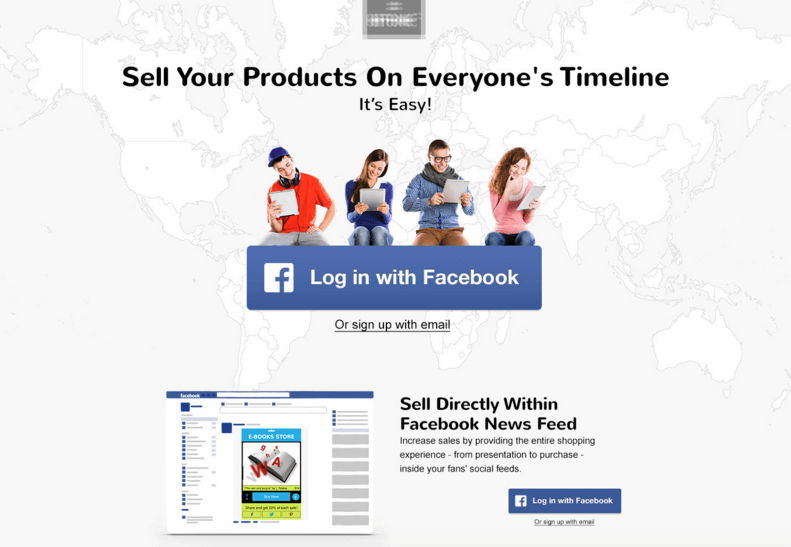
This variation increased registration by 35% and increased “Create A Store” by 85%.
Another test we ran was by adding a social login option here:
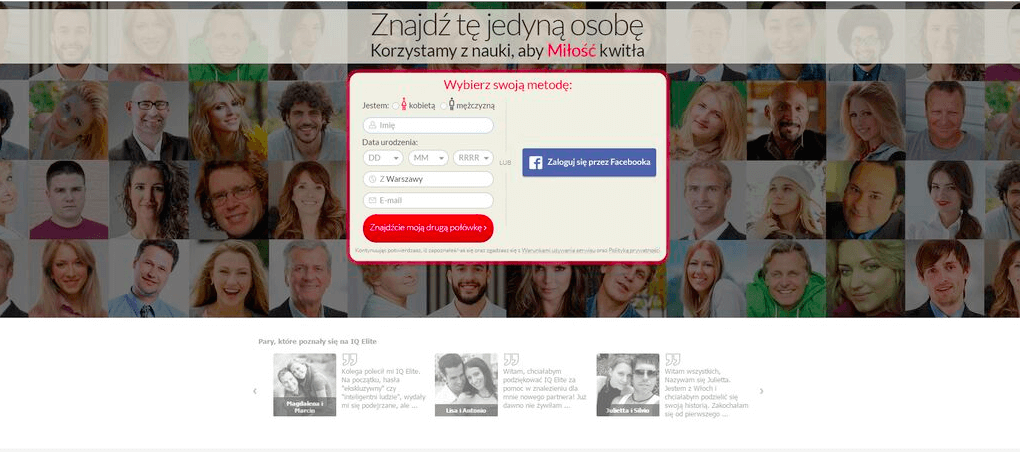
This variation increased registration by 14%!
As you can see, using social logins can increase registration and purchases.
While these tests improved registrations, you should take the points mentioned above into consideration, and test the addition of social logins to make sure they work for you. Now that you are informed, you can decide whether you think this is the right choice for you, and test how social logins influence your registration rates!
If you have any thoughts, numbers, and tests and have seen your registration increase with social logins – please share! We’d love to hear your stories!
P.S Author’s Note: As an avid reader who is concerned about privacy and the direction in which this global connectivity, data-sharing, technological society is going (but not enough to erase my Facebook account or Google accounts) , I recommend reading Dave Egger’s book, The Circle, a dystopian science fiction novel (that is now being turned into a movie with Emma Watson and Tom Hanks, but we all know you should read the book first!). If you’ve read it- let me know! I’d love to discuss it with you!


Pingback: Everything You Need To Know About Blogging()
Pingback: Weekly roundup: don't miss these posts about CRO()